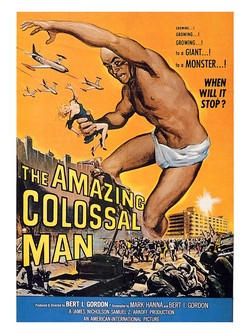
THE AMAZING COLOSSAL MAN
US, 1957, 80 minutes, Black and white.
Glenn Langan, Cathy Downs.
Directed by Bert I.Gordon.
The Amazing Colossal Man is a B Grade science fiction of the late fifties where such films were popular, before science fiction became really respectable. While the situation itself is meant to be interesting and entertaining, it is frightening and didactic in its implications. This can be compared with Jack Arnold's The Incredible Shrinking Man. The director and the creator of the special effects is Bert I. Cordon, who has made many films similarly over the years and in the seventies took up stories by H.G. Wells for horrendous special effect science fiction, The Food of the Gods and The Empire of the Ants. This particular film has all kinds of implications for ecology and pollution and is quite effective.
1. Good science fiction? The appeal of science fiction, the focus on science and Its possibilities for the world, dangers? An interpretation of the present via the experience of dangerous situations? The B film budget of this production? How enjoyable, the message, political? The 1950's, now?
2. How much reliance on special effects? How effective were they?
3. The plausibility of the plot? Could audiences identify with Manning?
4. The bomb situation, in the 1950s, now? The pros and cons of such testing? The opening and the build up to the count down, the malfunction, fear and anticipation?
5. The arrival of the small plane within this heightened atmosphere? The credibility of Manning's behaviour and concern? Real, contrived? The impact of the blast, his glimpse of it, shielding hid eyes, being burnt? ( And the repetition of this through out the film?)
6. The credibility of his survival? How well did the film trace his character within the flash backs of the Korean war, his love for Carol, the immediacy of his marriage? The revelation about hie skin? The revelation of his growth? The visualising of him as colossal? The effect on his mind, fears, Carol? His being transferred? Feeling victim, leaving? Menacing people on the road, Las Vegas? An ironic Gulliver? Carol and her attempts to help, the climax of the dam? The inevitability of his death? A symbol of victimisation of modern technology, a victim mutation, the inevitability of his death?
7. The portrayal of the army personnel and their attitudes? The experts and their healing? The comment on science, its values, its limitations, risks and dangers?
8. Carol as heroine? Her hopes, the encounter with the journalist, her discussions with Manning, sharing in the dangers at the end?
9. An exciting and effective plot? How much food for thought?